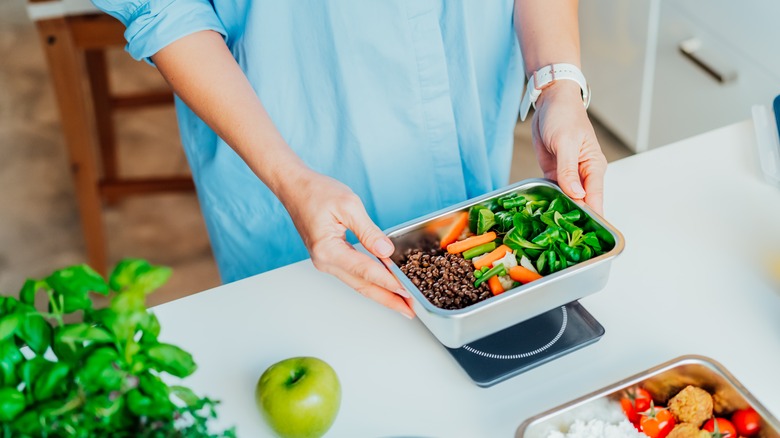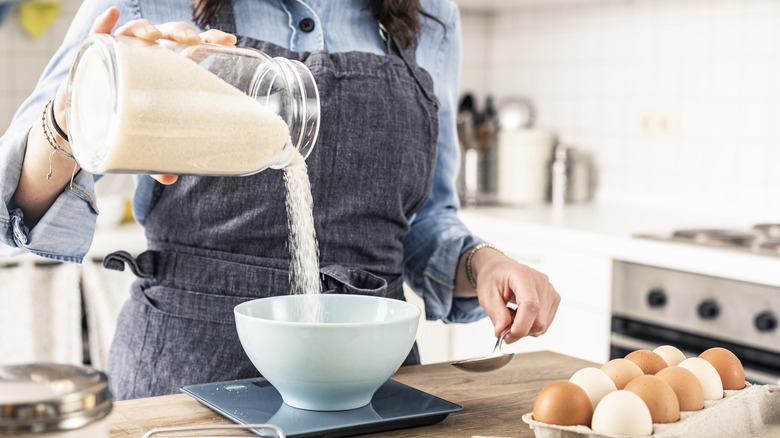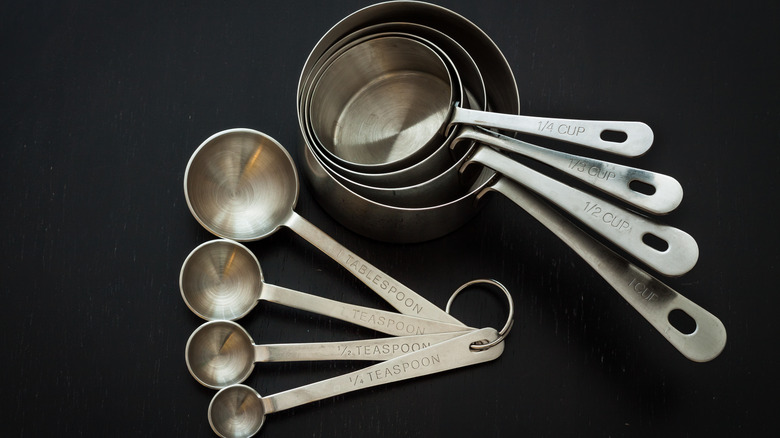Do You Need Measuring Cups If You Have A Kitchen Scale?
We may receive a commission on purchases made from links.
Precision is paramount in baking, where you're essentially dealing with chemical reactions. There's a science to it, and even elevation can affect what comes out of the oven. It's no surprise that many bakers prefer digital scales over measuring cups. A cup of liquid is consistent by weight, but a cup of flour or sugar can vary due to their ability to be loosely packed or compressed.
However, if you weigh your dry ingredients, there's no room for error, and those minute details can make the difference between a good bake and a great one. Once a bread, cake, pie, or pizza goes into the oven, there's not much that can be adjusted aside from oven settings and cook time, so it's crucial to ensure every step beforehand is followed to the T. This is where a digital scale comes into play. It minimizes external variables, eliminates the need for both wet and dry measuring cups, makes portioning easier, cuts down dirty dishes, and is a must-have tool for beginner bakers.
That said, a scale doesn't give you 100% freedom to throw away your measuring utensils, as not all chefs or recipes rely on digital scales. Measurements may also not be as crucial for the everyday home cook when sauteing shrimp or making a comforting bowl of soup. You can add spices to taste, adjust the heat, and make other alterations as you go, since everyone's palate is different. Baking, however, is less subjective and more exact, so you'll probably want to keep those cups and spoons around alongside your scale.
What to look for in a digital kitchen scale
You can find digital scales ranging from $14 to over $100. However, you likely don't need to spend more than $100, because then you're looking at a production kitchen-sized scale designed to weigh ingredients by the pound. That said, the cheapest scales may not be as accurate, accommodating, or durable as midrange options.
Another key aspect of a good kitchen scale is the size of the platform. You'll want a level surface to set the scale on, and a large enough platform to fit the base of your mixing bowls. Take a look at your kitchenware before making a purchase. If you use ceramic or glass bowls, you might want to consider a sturdier scale, as these materials weigh more than plastic or thin metal bowls.
There are also digital pocket scales available for those who have friends or family with understocked kitchens, or who need to portion out other ingredients on the go. Be sure to tare your scale after placing your measuring vessel on top to zero out the weight and avoid unnecessary math.
Why you need measuring cups and a scale
Ken Forkish — author of "Flour Water Salt Yeast" and other notable cookbooks — uses gram measurements frequently, but is kind enough to offer measuring cup and spoon equivalents. However, this sometimes leads to odd measurements like 3⅛ cups of water and 7¾ cups of all-purpose flour, which means you'll be using a full set of measuring utensils, and possibly more than one for each step.
On the flip side, a lot of online recipes stick to traditional measuring utensils, which means if you're using a scale, you'll need to convert measurements and figure out how much a tablespoon of sugar weighs, which differs from water or flour. There are also times when the amount called for is too light to register on certain digital scales, so you may have to eyeball how much four grams of yeast truly is. If every great cookbook author and recipe writer were as considerate as Forkish, it might be time to toss out those measuring cups — but until then, you'll want to keep your traditional tools close.



